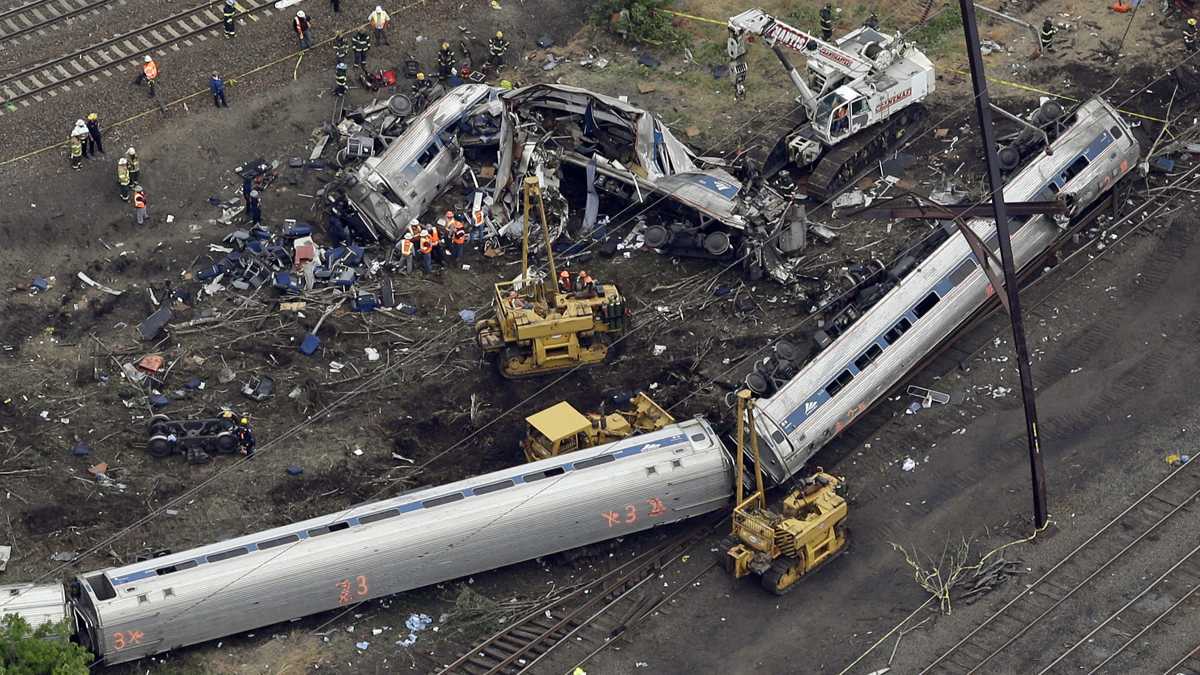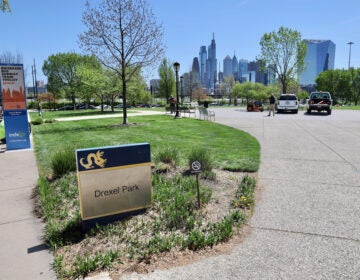No criminal charges for Amtrak engineer in deadly 2015 derailment

Emergency personnel work at the scene of a deadly train derailment, Wednesday, May 13, 2015, in Philadelphia. The Amtrak train, headed to New York City, derailed and crashed in Philadelphia killing at least six people and injuring dozens of others. (Patrick Semansky/AP Photo)
The engineer in control of Amtrak 188 when it derailed at the Frankford curve in Philadelphia in 2015, killing eight people and injuring 200 others, will not be criminally charged, the Philadelphia District Attorney’s Office announced today.
The office blames engineer Brandon Bostian for causing the crash by “operating the train far in excess of the speed limit,” but prosecutors decided Bostian did not commit a crime.
“We cannot conclude that the evidence rises to the high level necessary to charge the engineer or anyone else with a criminal offense,” the statement reads.
It continues: “We have no evidence that the engineer acted with criminal ‘intent’ or criminal ‘knowledge’ within the special meaning of those terms under Pennsylvania law for purposes of criminal charges. Nor do we believe there is sufficient evidence to prove, beyond a reasonable doubt, criminal recklessness, which would be the only other basis for criminal liability. Pennsylvania law specially states that one acts with criminal recklessness when a person ‘consciously disregards a substantial and unjustifiable risk.’ Based on the available information, we do not have evidence sufficient to prove beyond a reasonable doubt that the engineer ‘consciously’ disregarded the risk.”
The announcement comes three days before Friday’s second anniversary of the crash in Frankford. Friday also is the day when the statute of limitations for possible criminal charges expires.
The derailment led to more than 125 lawsuits, which ended last October in a $265 million settlement.
It was the deadliest wreck on the Northeast Corridor in nearly 30 years. Investigators later determined Bostian became distracted and lost “situational awareness,” and said a computerized speed-limiting technology called Positive Train Control, or PTC, would have prevented the crash had it been in place then. Since the crash, Amtrak has been installing PTC on regional rail lines, including the Northeast Corridor.
Prosecutors from the D.A.’s Office’s homicide unit reviewed evidence from Philadelphia police, Amtrak, and the National Transportation Safety Board and rode the train on its route leading to the derailment scene, where Bostian steered into a curve at 106 mph — more than twice the speed limit. The prosecutors consulted with experts in train operation and reviewed audiotapes of what Bostian said and heard before the derailment, his cell phone, cell phone records, and cell site data.
Attorney Robert Mongeluzzi, who has represented some of the passengers, said his clients were disappointed that prosecutors won’t charge Bostian. He called it a “double insult, considering federal law caps payouts in civil lawsuits.
“Victims are wondering: How could it be that he not be held accountable? Not even a speeding ticket,” Mongeluzzi said. “If someone was going 106 mph down Broad Street and killed eight and injured 230, they clearly would have been charged.”
He added: “There are jurors that, in my opinion, would have convicted. They could have heard Mr. Bostian’s story, had he chosen to testify, and made a decision, ‘do I believe that his memory has changed over time, or do I believe that that’s an excuse to avoid criminal culpability?’ A jury should be making that credibility decision.”
While the criminal question is now behind him, Bostian still isn’t done in court.
He sued his former employer for negligence in January, claiming he came “under attack by projectiles,” which led him to become “disoriented and/or unconscious,” while he was operating the train the night of the crash. A SEPTA rail operator had reported to authorities that someone had thrown rocks at his train as it passed in the minutes before Amtrak 188’s crash. NTSB investigators found no evidence that Amtrak 188 had been targeted or hit by rock-throwers.
WHYY is your source for fact-based, in-depth journalism and information. As a nonprofit organization, we rely on financial support from readers like you. Please give today.




